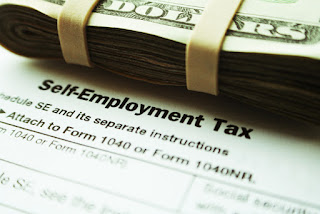Tax Tips to Use If You're Self-Employed
by Alek Sabin
More and more individuals are pursuing going into business for themselves, preferring to have control over their career rather than reporting to a chain of command within a company. Becoming self-employed can be nerve wrecking, as you have no way of guaranteeing the future. No matter how successful your first year of being self-employed went, you’re probably dreading tax season. Taxes aren’t something anyone really enjoys doing, but being self-employed can make filing your taxes a much more daunting task.

Tax season can be a complicated time, but it can be downright overwhelming if you are self-employed and are trying to figure out the nuances of the tax code on your own. Oftentimes, it may be easier simply to let someone else do it. However, even if you hire out for your taxes, it’s still important to have a baseline understanding of taxes for the self-employed entrepreneur.
Here are some important things that you should always have in mind when you are filing your taxes:
- Your specific legal entity that you set your business under will greatly affect your tax burden.
- You can almost always deduct more than you think you can.
- Almost any business expense can be translated as some sort of tax deduction (for example: your personal vehicle)
- Your initial tax payment may be an estimation, rather than a specific amount.
- There are specific taxes that come into play when you are self-employed.
Always Put Away 30% for Taxes
Taxes can quickly catch you off guard, if you only think about them when tax time comes up. For this reason, the easiest way to be ready to pay the taxman every spring is to put away at least 30% of your monthly income. It is very unlikely that your taxes will actually amount to that much, so you should definitely be able to pay your taxes with ease. As an added bonus, the remainer of your 30% will feel somewhat like a tax return.

Understand the Specifics of Self-Employed Taxes
Being employed at a company means that they withhold your income and Social Security and Medicare taxes from each paycheck. Oftentimes, they withhold too much, which will result in a tax return when you file your taxes. When you are self-employed, no one is withholding these taxes for you, which results in having to pay these taxes when it comes time to file your taxes.
Instead of getting a W2 form 1040 in the mail at the beginning of the year to make filing your taxes a simple task, you have to fill out your 1040 form yourself. While this may seem difficult, after doing it a few times you’ll be filing your taxes yourself with ease. The IRS website has a lot of resources to access these forms and instructions on how to fill them out.
Keep Track of Deductions
Even when you’re not self-employed, you’re sometimes eligible for certain deductions that will save you some money when filing your taxes. When you’re self-employed, you’re eligible for a few different deductions. For example, if you work out of a home office, it’s possible you’ll be able to deduct some of the expenses of your home. This is called the home office deduction, and is available to both homeowners and renters. Other examples of this include business-related travel, business supplies, and potentially things like healthcare, depending on how you set it up.
Something important to remember throughout the year to make your tax process easier, is to not only keep track of your income, but also your expenses. Save any receipts that you got from business expenses. For example, if your line of business requires you to travel a lot, save receipts from gas stations, purchasing airline tickets, and business related hotel stays.
Thanks to Aurora McCausland for this guest post!
Thanks to Aurora McCausland for this guest post!
#TaxTime #SelfEmployed #AuroraMcCausland #GuestPost


No comments:
Post a Comment